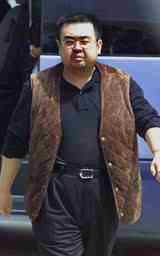Kim's eldest son disappears
Kim Jung Nam, Kimg Jung Il's Eldest Son
HONG KONG - Mr Kim Jong Nam, once seen as North Korea's heir apparent, has disappeared from the public eye since the news of his father's death last Monday.
The eldest son of the late Kim Jong Il fell out of favour in 2001 when he was caught trying to enter Japan on a fake passport, claiming he wanted to take his family to Tokyo Disneyland. Since then, Mr Kim Jong Nam, the older half-brother of North Korea's new leader Mr Kim Jong Un, has apparently based himself in the Chinese territory of Macau. He is also reported to have stayed in Beijing for some time.
But observers in the former Portuguese colony of Macau said Mr Kim Jong Nam has kept his head down in the past week, reported AFP. "He's moving here and there. It has been hard to track him down," said Mr Ricardo Pinto, publisher of Macau Closer magazine.
"It appears that he lives at his house sometimes, and sometimes he stays at different hotels.
There's no indication where he is living now."
The last public appearance of Mr Kim Jong Nam was in January when he told the Tokyo Shimbun that his father, who assumed command of the country in 1994 after North Korean Kim Il Sung died, was against keeping power within the family for a third generation.
"Hereditary succession did not happen even under Chinese chairman Mao Zedong," Mr Kim Jong Nam told the newspaper at an undisclosed location in southern China.
"It does not fit socialism and my father was against it. I understand that it was done in order to stabilise the framework of the nation," he said, adding that an unstable North Korea would disrupt the "surrounding region".
Pyongyang observers have for years tracked Mr Kim Jong Nam, 40, for any clues about succession plans in notoriously secretive North Korea. But his decade of living in virtual exile, with Mr Kim Jong Nam's living it up in the gambling haven of Macau may have ruled him out of any future plans drawn up by the austere ruling elite back home.
"He has been in exile for too long and has no more political base in North Korea," said political analyst Dr Joseph Cheng of Hong Kong's City University.
"It's very unlikely he will have any role."
